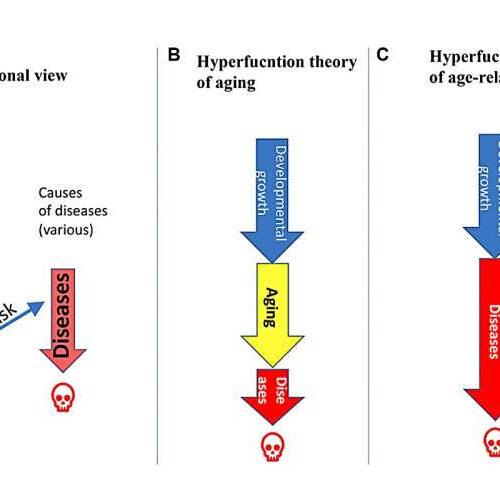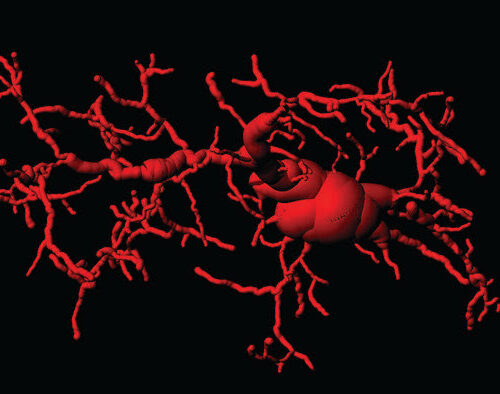By UNIVERSITY OF ROCHESTER AUGUST 27, 2023 Researchers successfully transferred a longevity gene from naked mole rats to mice, leading to enhanced health and increased lifespan. Naked mole rats, noted for their resistance to age-related diseases, have a gene that produces high molecular weight hyaluronic acid (HMW-HA), which when introduced to mice, demonstrated potential anti-aging benefits. The...
Category: <span>Anti-aging</span>
Aging with a healthy brain: How lifestyle changes could help prevent up to 40% of dementia cases
by Stefanie Tremblay, The Conversation Modifiable risk factors for dementia include high blood pressure, obesity, physical inactivity, diabetes, smoking, excessive alcohol consumption and infrequent social contact. Credit: ShutterstockA 65-year-old woman repeatedly seeks medical help for her failing memory. She is first told it’s nothing to worry about, then, a year later, that it’s “just normal...
Blood factor can turn back time in the aging brain
UNIVERSITY OF CALIFORNIA – SAN FRANCISCO Blood Factor Can Turn Back Time in the Aging Brain Platelets are behind the cognitive benefits of young blood, exercise and the longevity hormone klotho In a remarkable convergence, scientists have discovered that the same blood factor is responsible for the cognitive enhancement that results from young blood transfusion, the...
Patients prescribed intermittent corticosteroids are less likely to have fracture risks considered, research suggests
by London School of Hygiene & Tropical Medicine Credit: CC0 Public Domain Prolonged use of corticosteroids, such as prednisolone, has been shown to cause osteoporosis and therefore increases the risk of breaking a bone. The more corticosteroids are taken, the greater the damage can be. In individuals with prolonged corticosteroid use, especially in older age, fracture preventive measures are...
A novel theory of aging, independent of damage accumulation
by Impact Journals LLC Outcomes of cell competition and control by selective destruction. Credit: Aging (2023). DOI: 10.18632/aging.204956 A new editorial paper titled “A novel theory of ageing independent of damage accumulation” has been published in Aging. The underlying cause or causes of aging are an enduring mystery, but in 1977, Kirkwood postulated that organisms might gain a...
Inhibiting NLRP3 signaling in aging podocytes improves longevity
by Impact Journals LLC Podocyte inflammaging is reduced by inhibiting NLRP3. Credit: Aging (2023). DOI: 10.18632/aging.204897 A new research paper titled “Inhibiting NLRP3 signaling in aging podocytes improves their life- and health-span” has been published in Aging. The decrease in the podocytes’ lifespan and health span that typify healthy kidney aging cause a decrease in their normal structure, physiology and...
Unveiling a new mechanism that accelerates aging of adipose tissues
by Pohang University of Science and Technology Metabolic phenotype affected by aging and adipocyte-specific Crtc2 knockout. Adipocyte-specific Crtc2 knockout mice (Crtc2 AKO) confirmed a suppression of impaired glucose tolerance (A) and an increase in fat mass (B) caused by aging. Moreover, Crtc2 AKO mice exhibited a significant reduction in fat accumulation in the liver and adipose...
Towards disease-oriented dosing of rapamycin for longevity
by Impact Journals LLC Relations between aging and age-related diseases (ARDs). Credit: Aging (2023). DOI: 10.18632/aging.204920 A new research perspective titled “Towards disease-oriented dosing of rapamycin for longevity: does aging exist or only age-related diseases?” has been published in Aging. In his new research perspective, Dr. Mikhail V. Blagosklonny from Roswell Park Comprehensive Cancer Center discusses aging and rapamycin (Sirolimus)—the only drug...
How immunity contributes to ageing and neurodegeneration
ECOLE POLYTECHNIQUE FÉDÉRALE DE LAUSANNE IMAGE: AN ACTIVATED MICROGLIAL CELL IN THE BRAIN OF CGAS/STING ACTIVATED MICE. CREDIT: GULEN ET AL. NATURE 02 AUGUST 2023. DOI: 10.1038/S41586-023-06373-1 As we age, our bodies undergo various changes that can impact our overall health and make us more susceptible to diseases. One common factor in the ageing process...
Moderna is safest, most effective mRNA vaccine against COVID-19 for older adults, study shows
by Brown University Credit: CC0 Public Domain While mRNA vaccines against COVID-19 have been found to be safe and effective for the general population, in-depth evidence about safety and effectiveness for older adults and individuals with chronic health conditions is more limited. To address that gap, a team led by Brown University researchers conducted the largest...









